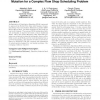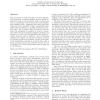48 search results - page 2 / 10 » The Complexity of Mean Flow Time Scheduling Problems with Re... |
GECCO
2007
Springer
13 years 11 months ago
2007
Springer
An Estimation of Distribution Algorithm (EDA) is proposed to approach the Hybrid Flow Shop with Sequence Dependent Setup Times and Uniform Machines in parallel (HFSSDST-UM) proble...
IPCO
1998
13 years 6 months ago
1998
We provide several non-approximability results for deterministic scheduling problems whose objective is to minimize the total job completion time. Unless P = NP, none of the probl...
ACSC
2008
IEEE
13 years 11 months ago
2008
IEEE
The movement of items through a product distribution network is a complex dynamic process which depends not only on the network’s static topology but also on a knowledge of how ...
JSSPP
2009
Springer
13 years 11 months ago
2009
Springer
Abstract. As multi-core processors proliferate, it has become more important than ever to ensure efficient execution of parallel jobs on multiprocessor systems. In this paper, we s...
ALGORITHMICA
2004
13 years 4 months ago
2004
We consider the problem of scheduling dynamically arriving jobs in a non-clairvoyant setting, that is, when the size of a job in remains unknown until the job finishes execution. ...


